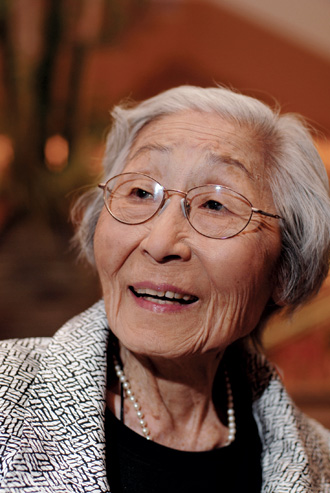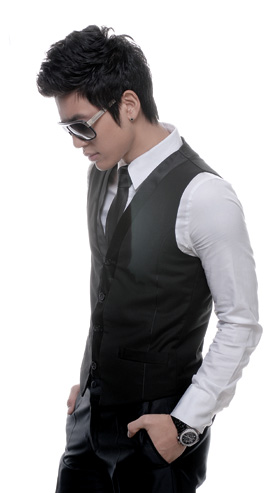Susan Ahn Cuddy, 94, answers a KA-style Proust questionnaire.
Interviewed by JULIE HA
As the daughter of iconic Korean independence leader Ahn Chang Ho and his tough-as-nails patriot wife Helen Ahn, Susan Ahn Cuddy often gets overshadowed by this hefty legacy, though she’s valiantly fought her own share of battles.
The U.S. Navy initially rejected her when she applied for officer training because she was Asian and anti-miscegenation laws in Virginia prevented her from marrying Frank Cuddy, an Irish American. The type who doesn’t take no for an answer, Cuddy became the Navy’s first female gunnery officer (that means she trained male pilots how to shoot 50-caliber machine guns) in 1944, went on to work for the National Security Agency where she had 300 intelligence specialists under her command, and did marry her Irishman with whom she had two children.
And these milestones only cover the first half of her life. In more recent history, Cuddy riled up a crowd of 9,000 at an Obama rally at UCLA before the California primary. In other words, even at 4-11, 70 pounds with a walking cane, the disarmingly feisty Cuddy has still got it.
She celebrated her 94th birthday Jan. 16 with a community bash in Los Angeles’ Koreatown, and before blowing out the candles, indulged KoreAm’s Proust-like probing.
[ad#336]
KoreAm: How do you identify yourself — as a Korean American, American, Korean…?
The right thing in my mind would be to say I’m a Korean American or American Korean, but using the two together because you’re never going to get rid of your yellow skin.
KoreAm: Where is home for you?
Los Angeles, where I was born and raised.
KoreAm: What do you consider your strongest qualities?
I’ve always been myself and never been under the shadow of anybody except my mother and father, my father being who he is and my mother being his greatest supporter.
KoreAm: What is your idea of happiness?
It’s defining yourself and what you like to do. There should be no conflict within yourself. Do your own thing.
KoreAm: Three qualities to describe your mother:
Courageous, loving, patriotic.
KoreAm: Three qualities to describe your father:
Loving, understanding, and just tried to be a good father.
KoreAm: What accomplishment are you most proud of?
Being a member of the National Security Agency (in the 1940s and ‘50s) because I had to break down barriers. When I first reported to my station at the NSA in Washington, D.C., they put out an alert because here I am, an Asian, and they usually didn’t allow any Asians to look at their [classified] codes.
[ad#336]
KoreAm: What is your biggest regret?
I don’t have any. I achieved what I wanted to, and I’m very fortunate I have two wonderful children.
KoreAm: What quality do you least like about yourself?
You know, I’m very accepting.
KoreAm: What makes you laugh?
A lot of things. Anything, actually. I’m sort of a happy person.
KoreAm: What makes you cry?
Not much. I have never felt sorry for myself.
KoreAm: Any guilty pleasures?
The Lakers on TV. Sometimes I make my schedule around theirs.
KoreAm: Describe an experience with discrimination.
Being denied officer training in the Navy. But it was no big thing. I was very successful in life. I never had a feeling I was denied anything on a personal basis; it was the particular time of life. I think as far as racism is concerned, it’s how you [respond to] it and go on with your life.
KoreAm: What historical event has had the most influence on your life?
The March 1st Movement in 1919.
KoreAm: Who are your heroes or heroines?
Abraham Lincoln because of his honesty — that’s another thing my father was so into. The other one would be Maria Kim, one of the heroes of the March 1st Movement.
KoreAm: What’s your favorite movie?
It’s A Mad Mad Mad Mad World from the ‘60s.
KoreAm: What’s your favorite Korean comfort food?
Miyokguk (seaweed soup).
KoreAm: What qualities of Korean culture and people do you most admire?
Their academic achievement because even the second- and third-generation youngsters here achieve, and I like that.
KoreAm: What qualities of Korean culture and people frustrate you the most?
I’m very accepting. But Koreans can be very pushy and opportunistic when it comes to using my father.
KoreAm: Do you believe there is a God?
Yes, definitely.
KoreAm: What do you think happens to us after we die?
I’m not sure, but I think it’s whatever you’re raised to believe. I believe I’ll go to bigger grounds — I don’t know if it’s heaven or not. But I think I’ll go there and meet my father and mother and my two brothers who are gone.
KoreAm: If you could impart one lesson or truth to other Korean Americans, what would that be?
Serve your country to the best of your ability, and now with politics, professions and everything open to anyone who wants to achieve, well, look at Obama! So as far as the Koreans are concerned, we can do anything.
KoreAm: What is your personal motto that has guided you through life?
Courage to do the right thing.







